Unit 3 It must belong to Carla.Section A(1-4c)课件(共76张PPT,含内嵌音频) 鲁教版五四制九年级英语全册
文档属性
| 名称 | Unit 3 It must belong to Carla.Section A(1-4c)课件(共76张PPT,含内嵌音频) 鲁教版五四制九年级英语全册 |
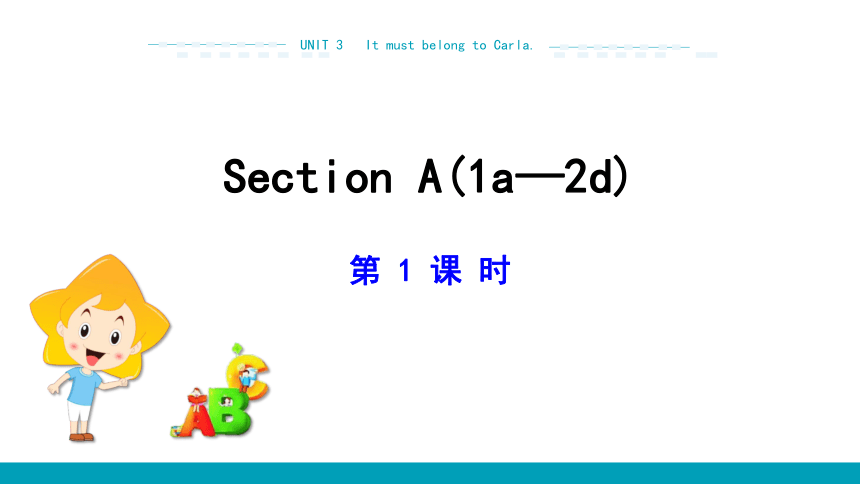
|
|
| 格式 | pptx | ||
| 文件大小 | 14.9MB | ||
| 资源类型 | 教案 | ||
| 版本资源 | 鲁教版 | ||
| 科目 | 英语 | ||
| 更新时间 | 2024-09-16 17:05:02 | ||
图片预览

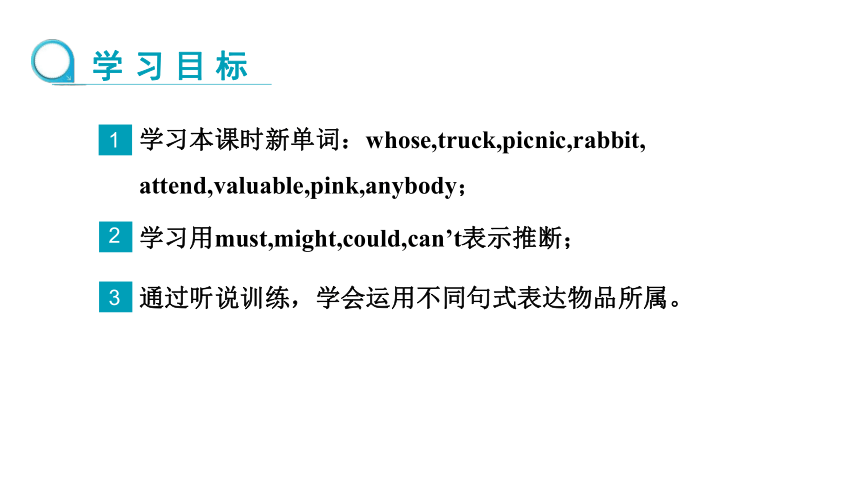
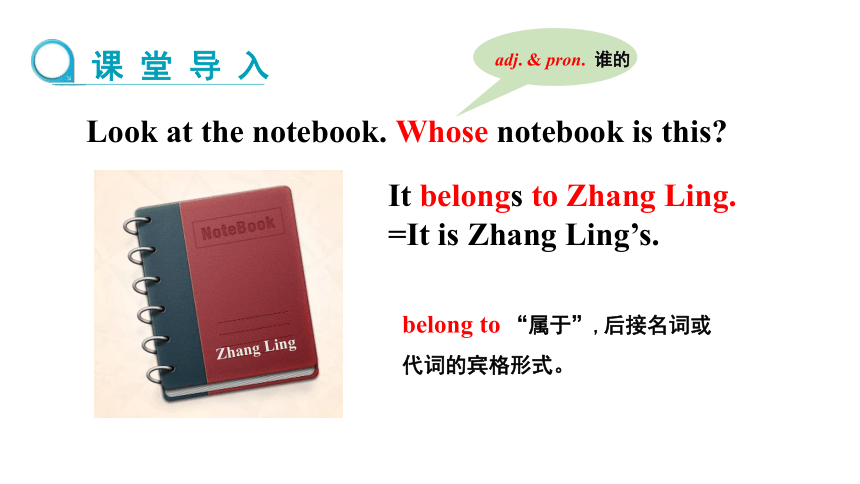
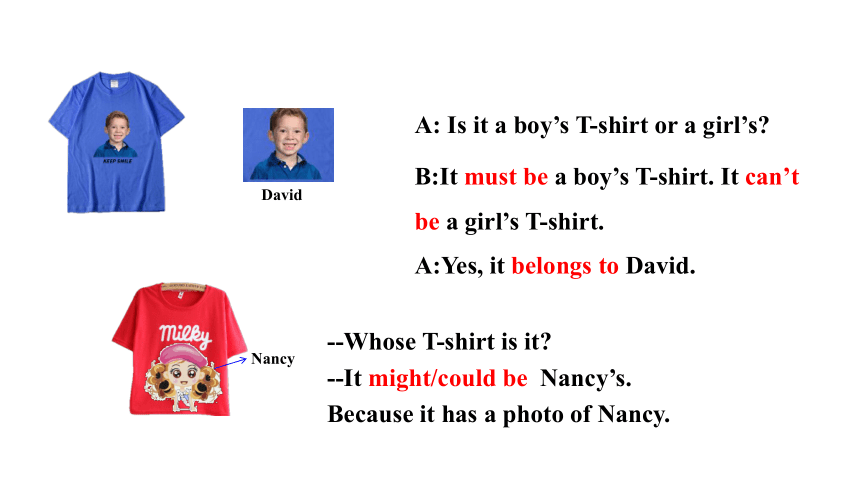

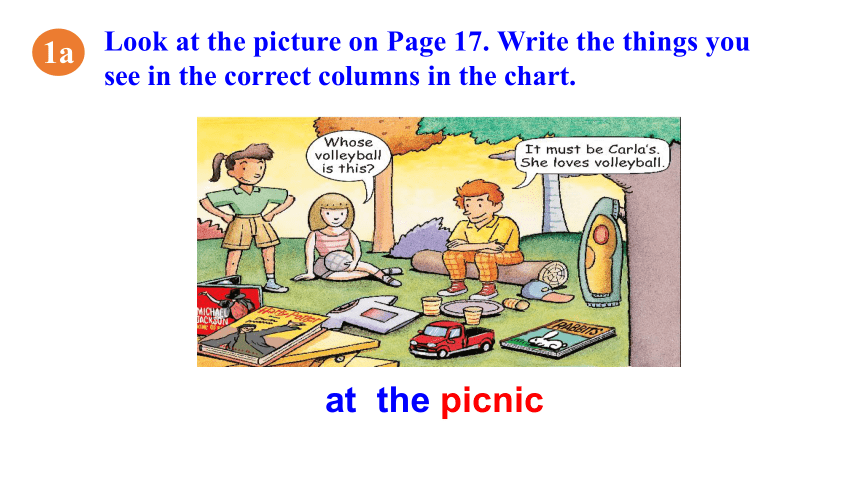
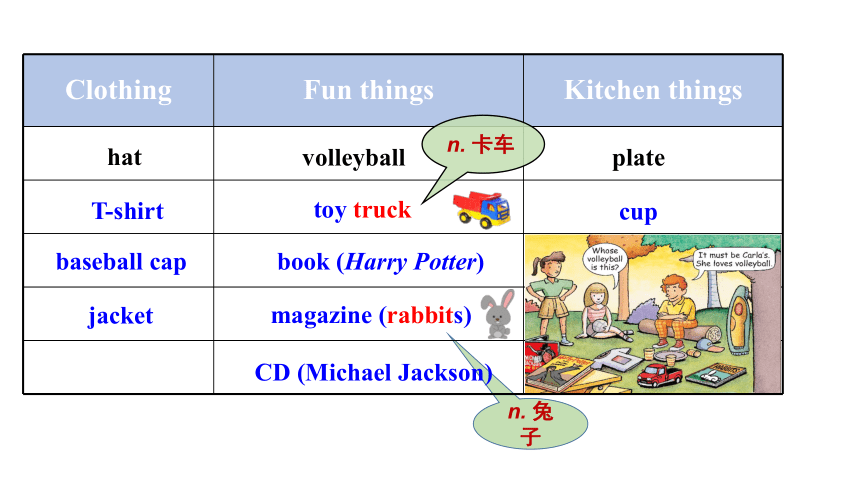
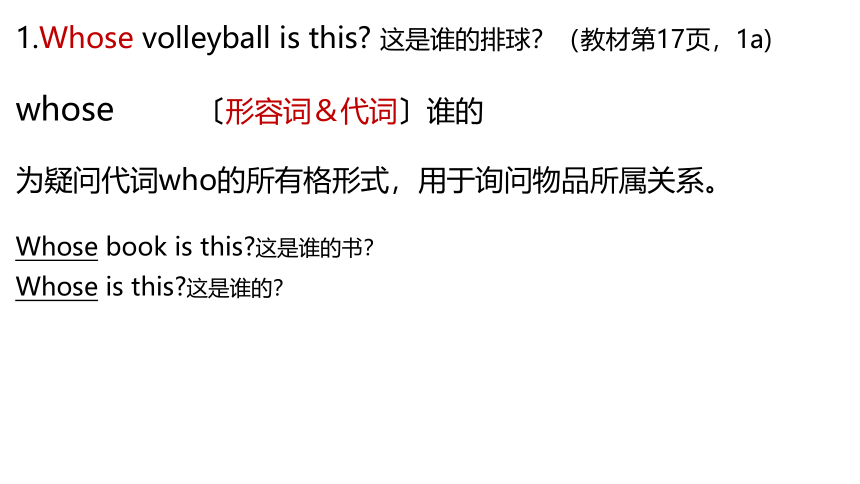
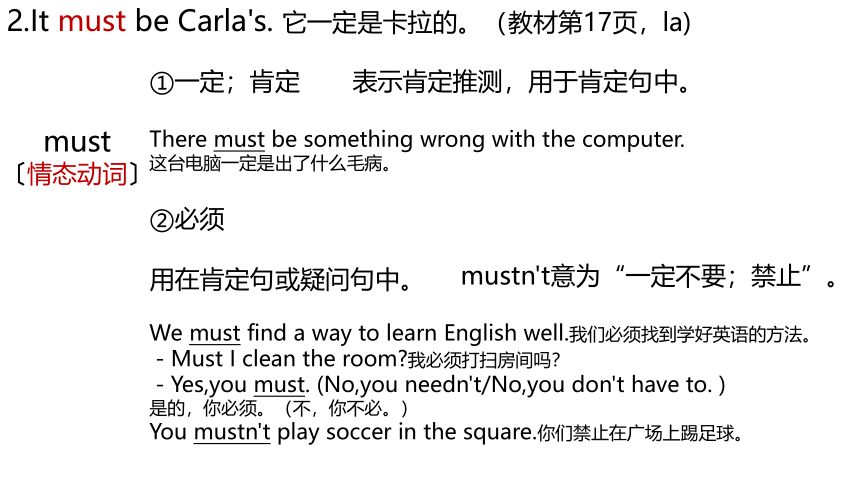
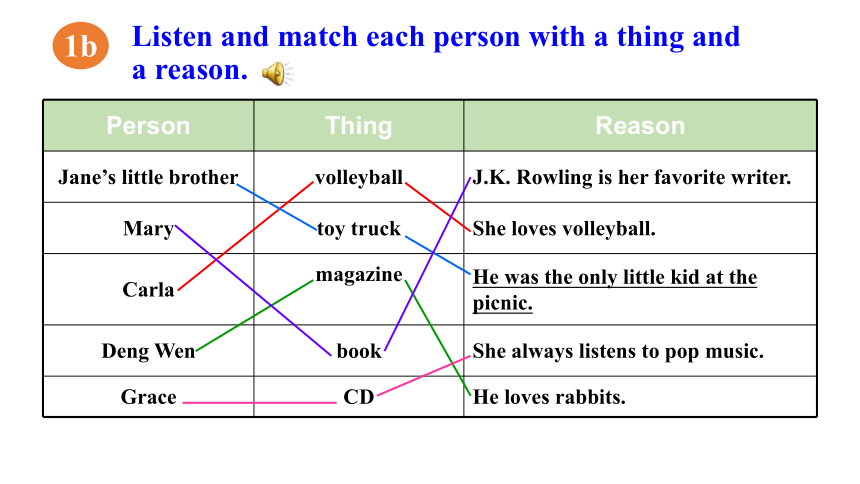
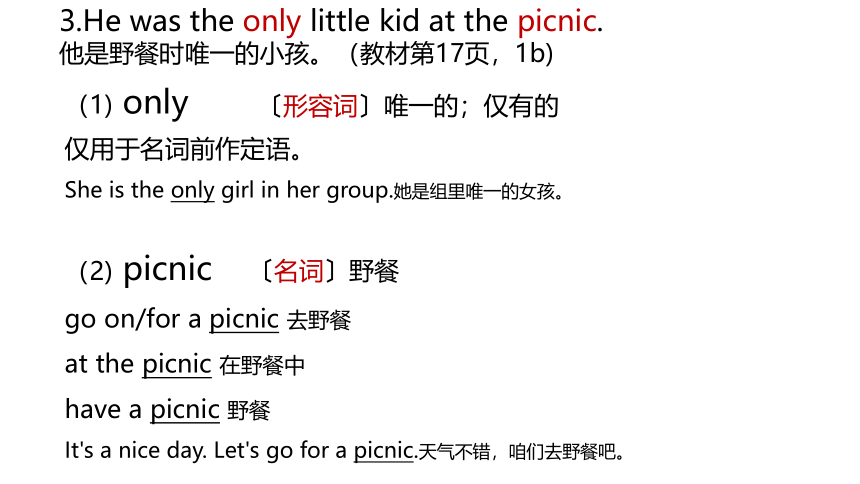
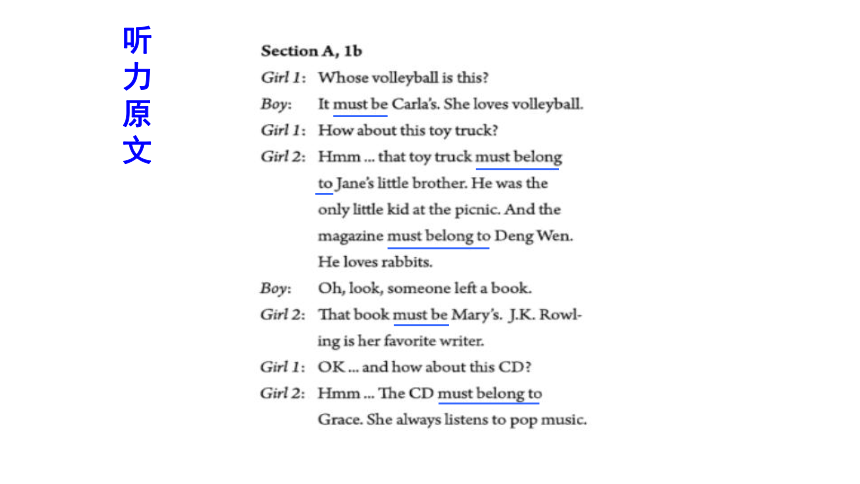
文档简介
(共76张PPT)
Section A(1a—2d)
UNIT 3 It must belong to Carla.
第 1 课 时
学 习 目 标
学习本课时新单词:whose,truck,picnic,rabbit, attend,valuable,pink,anybody;
1
3
通过听说训练,学会运用不同句式表达物品所属。
学习用must,might,could,can’t表示推断;
2
课 堂 导 入
Look at the notebook. Whose notebook is this
Zhang Ling
It belongs to Zhang Ling.
=It is Zhang Ling’s.
belong to “属于”,后接名词或
代词的宾格形式。
adj. & pron. 谁的
David
Nancy
A: Is it a boy’s T-shirt or a girl’s
A:Yes, it belongs to David.
--Whose T-shirt is it
--It might/could be Nancy’s. Because it has a photo of Nancy.
B:It must be a boy’s T-shirt. It can’t
be a girl’s T-shirt.
must: The book must be Mary’s. We can
see her name on it.
might: — Whose English book is this
— It might be Lily’s,but I’m not sure.
could: The bag could be Linda’s. Or it might belong
to Lucy. They both like red.
can’t: The boy can’t be Tom. I saw him reading in the
library just now.
课 堂 学 习
1a
Look at the picture on Page 17. Write the things you see in the correct columns in the chart.
at the picnic
n. 兔子
Clothing Fun things Kitchen things
T-shirt
baseball cap
magazine (rabbits)
book (Harry Potter)
toy truck
CD (Michael Jackson)
cup
plate
volleyball
hat
jacket
n. 卡车
1.Whose volleyball is this 这是谁的排球?(教材第17页,1a)
whose
为疑问代词who的所有格形式,用于询问物品所属关系。
Whose book is this 这是谁的书?
Whose is this 这是谁的?
〔形容词&代词〕谁的
2.It must be Carla's. 它一定是卡拉的。(教材第17页,la)
must
〔情态动词〕
①一定;肯定
There must be something wrong with the computer.
这台电脑一定是出了什么毛病。
②必须
用在肯定句或疑问句中。
We must find a way to learn English well.我们必须找到学好英语的方法。
-Must I clean the room 我必须打扫房间吗?
-Yes,you must. (No,you needn't/No,you don't have to. )
是的,你必须。(不,你不必。)
You mustn't play soccer in the square.你们禁止在广场上踢足球。
表示肯定推测,用于肯定句中。
mustn't意为“一定不要;禁止”。
Listen and match each person with a thing and a reason.
1b
Person Thing Reason
Jane’s little brother volleyball J.K. Rowling is her favorite writer.
Mary toy truck She loves volleyball.
Carla magazine He was the only little kid at the picnic.
Deng Wen book She always listens to pop music.
Grace CD He loves rabbits.
3.He was the only little kid at the picnic.
他是野餐时唯一的小孩。(教材第17页,1b)
(1) only
仅用于名词前作定语。
She is the only girl in her group.她是组里唯一的女孩。
〔形容词〕唯一的;仅有的
(2) picnic
go on/for a picnic 去野餐
at the picnic 在野餐中
have a picnic 野餐
It's a nice day. Let's go for a picnic.天气不错,咱们去野餐吧。
〔名词〕野餐
听力原文
1c
Practice the conversation in the picture above.Then make conversations using the information in 1b.
Pair work
A:Whose volleyball is this
B:It must be Cara’s. She loves volleyball.
Bob and Anna found a schoolbag at the park. Listen and write down the things in the schoolbag.
Things in the schoolbag
1.
2.
3.
T-shirt
hair band
tennis ball
2a
1. The person _____ go to our school.
2. The person ______ be a boy.
3. It _____ be Mei’s hair band.
4. The hair band ______ belong to Linda.
5. It _____ be Linda’s schoolbag.
2b
must
can’t
could
might
must
Listen again. Fill in the blanks.
4.The hair band might belong to Linda.
这条发带可能属于琳达。(教材第18页,2b)
belong to
That book belongs to me. 那本书是我的。
These clothes must belong to Tom.这些衣服一定是汤姆的。
拓展
sth. belong(s) to sb. (某物属于某人)
可与 sth.is/are sb. 's(某物是某人的)进行同义句转换。
belong为不及物动词,to为介词,
后接名词或人称代词的宾格形式,
不能接名词性物主代词或名词所有格。
其主语通常是物。
注意:belong to不能用于进行时态,也不能用于被动语态。
It must belong to Victor. = It must be Victor's.它一定是维克托的。
属于
Make conversations using the information in 2a and 2b.
2c
Look! There’s a
schoolbag here.
What’s inside
There’s a
T-shirt, ...
It must belong
to…
Read the conversation.
Linda
Mom
lost her schoolbag
attended a concert
pink hair band
tennis balls
valuable adj. 贵重的 anybody pron. 任何人
[ tend d]
V. 出席;参加
2d
[ v lju bl]
Linda: Mom,I’m really worried.
Mom: Why What’s wrong
Linda: I can’t find my schoolbag.
Mom: Well,where did you last put it
Linda: I can’t remember! I attended a concert yesterday so it might still be in the music hall.
Mom: Do you have anything valuable in your schoolbag
Linda: No, just my books, my pink hair band and some tennis balls.
Mom: So it can’t be stolen.
Linda: Oh, wait! I went to a picnic after the concert. I remember I had
my schoolbag with me at the picnic.
Mom: So could it still be at the park
Linda: Yes. I left early, before the rest of my friends . I think somebody must
have picked it up. I’ll call them now to check if anybody has it .
What’ s the matter
What ’ s the trouble
形容词修饰不定代词,
要放在不定代词之后。
must have done 一定做过.......
含有情态动词的被动语态
5.What's wrong 怎么了?(教材第18页,2d)
What's wrong(with. . . ) (·····)怎么了?
用来询问某人发生了什么事情或某物有什么问题。
What's wrong with her 她怎么了?
What's wrong with your teeth 你的牙齿怎么了?
拓展
表示“······怎么了/出什么事了?”
还可用“What's the matter/the trouble with. . . ”。
What's the matter/the trouble with your classmate 你的同班同学怎么了?
6.I attended a concert yesterday so it might still be in the music hall.
昨天我参加了一场音乐会,所以它可能仍然在音乐大厅里。(教材第18页,2d)
辨析:attend, join 与 take part in
attend
join
take part in
出席;参加
加入;成为·····的一员
参加
比较正式的用语,常用于参加会议、婚礼、
葬礼,听报告,听音乐会,看演出,听演讲等
指加入某个党派、团体、组织等,
并成为其中的一员,如“参军、入团、入党”等
指参加群众性活动等,并在其中发挥积极作用
A little boy invited his mother to attend his school's first teacher-parent meeting.
一个小男孩邀请他妈妈参加他学校的第一次家长会。
She joined the Young Pioneers.她加入了少先队。
We'll take part in social practice during thesummer vacation.
暑假期间我们将参加社会实践。
[ tend d]
7.Do you have anything valuable in your schoolbag
你的书包里有什么贵重物品吗?(教材第18页,2d)
valuable
〔形容词〕贵重的;很有用的;宝贵的
Is this ring valuable 这枚戒指值钱吗?
She has got a lot of valuable information.她有许多有价值的信息。
拓展
value[ v lju ]〔名词〕价值
〔动词〕重视,珍视
[ v lju bl]
8.I think somebody must have picked it up.
我想一定有人捡到它了。(教材第18页,2d)
(1) must have done
用于肯定句中, 表示对过去已经发生的事的肯定推测。
You didn't know that man so you must have mistaken him.
你不了解那个人,所以你一定误会他了。
拓展
should have done 本来应该做·······
含有“实际上没做”的意思,
可用于肯定句,否定句或疑问句中,表示责备或遗憾等。
I should have thought of it.我本应该想到这一点的。
一定做过·······
①拾起,捡起
是“动词+副词”结构。
名词作宾语时可放在up前或up后;
人称代词作宾通时,要放在中间。
Please pick up the zippers on the floor.
请把地板上的拉链捡起来。
The zippers are on the floor. Please pick them up.
拉链在地板上,请把它们捡起来。
(2) pick up
②搭载;接载
常接人作宾语。
I'll pick you up at the station.
我会到车站接你。
9.I'll call them now to check if anybody has it.
现在我要给他们打电话,看看是否有人捡到了它。(教材第18页,2d)
(1)call sb.
I will call you if I have time.我如果有时间,会给你打电话。
拓展“给某人打电话”的常用短语还有:
①phone/telephone/ring sb.
②give sb.a call/ring
③make a telephone call to sb.
④ring/call sb.up
(注意:ring/call up为“动词+副词”结构,人称代词作宾语时,放在中间)
给某人打电话
(2)anybody
〔复合不定代词〕任何人
相当于anyone,常用于疑问句、否定句或if条件句中。
anybody作主语时,谓语动词用第三人称单数形式。
Is anybody there 有人(在这里)吗?
I didn't meet anybody on the way home.在回家的路上,我没遇到任何人。
If anybody knows his address, please tell me. 如果有人知道他的地址,请告诉我。
拓展
anybody 任何人;无论谁
The article is so easy that anybody can read it. 这篇文章很容易,任何人都能读懂。
用于肯定句中。
Role-play the conversation.
Linda’s really worried. She can’t find her schoolbag. She ________________ yesterday so it ___________ in the music hall. There isn’t anything valuable in her schoolbag. So it ________ stolen. Then she remembers that she ______________ after the concert and had her schoolbag with her ___________. So it ____________ at the park. And she thinks somebody must have __________. Linda will call them now to check if anybody has it.
Listen to the conversation and fill in the blanks.
attended a concert
might still be
can’t be
went to a picnic
at the picnic
could still be
picked it up
I.根据首字母提示及句意填单词。
1. The r_______ mainly live on grass and carrots.
2. You look really great in this p_______ dress, Linda.
3. You can't find a________/a______here. They're all at a meeting.
4. It depends on the weather whether we can go out for a p______ this Sunday.
5. Joe was knocked down by a t______ on his way home and was sent to hospital at once.
abbits
ink
nybody nyone
icnic
ruck
II.单项选择
1.Mary _____ be in Paris. I saw her in town only a few minutes ago.
A. mustn’t B. might not C. can’t D. may not
2. Peter _____ come with us tonight, but he isn’t very sure yet.
A. must B. may C. can D. can’t
III. 根据句意及提示完成句子,每空一词。
1.--_______ ________ (谁的杂志)is this
--It _______ ____ (属于)Li Lei. He loves reading.
2. Eric ______ ______ ______ ______(捡起铅笔) on the floor and gave it
to me.
3. Mrs. Depp has _________ _______(一些贵重的东西) in her handbag.
4. Get off the bus one stop before your school and walk _____ _____ _____(其余的) the way.
picked up the pencil
something valuable
Whose magazine
belongs to
the rest
of
3. I thought you _____ like something to read, so I have brought you some books.
A. can’t B. might C. could D. must
Section A(3a—4c)
UNIT 3 It must belong to Carla.
第 2 课 时
学 习 目 标
学习本课时新单词: happening,noise,policeman,wolf, uneasy, laboratory, outdoors, coat, sleepy;
1
3
通过阅读关于小镇怪声的文章,能有效获取阅读信息,归纳主题。
学习情态动词表推测的用法;
2
Whose skirt is this
It must belong to Jane.
(=It must be Jane’s.)
Jane
Mike
Because she is a girl.
(Because boys don’t
wear skirts.)
课 堂 导 入
Fred
Whose guitar is this
It could/might be Fred’s. It could/might belong to Fred. He likes music.
Can this T-shirt be John’s
It can’t be John’s.
Because it’s much
too small for him.
John
课 堂 学 习
happening n.事件;发生的事情(常指不寻常的)
noise n. 声音;噪音
policeman n. (pl.policemen)男警察
wolf n. (pl.wolves)狼
uneasy adj. 担心的;不安的
laboratory n. 实验室
outdoors adv. 在户外;在野外
coat n. 外套;外衣
sleepy adj. 困倦的;瞌睡的
New words
[l b r tri]
课文导入
Look at this woman.
She is looking out of the window.
What’s happening outside
Today, let’s read the article of 3a and find out the answer.
Read the article and decide which might be the best title.
A. A Small and Quiet Town
B. Strange Happenings in My Town
C. Animals in Our Neighborhood
Skimming:
Look through the passage quickly to find the main idea without having to read every word.
3a
体裁:记叙文
浏览
标题:
开门见山式,作者直截了当地概括了文章的主要内容。
Read the passage and then answer the questions.
What’s happening in the small town
How did people feel
People in the town could hear strange noises outside their window every night.
Everyone in the town is feeling uneasy.
We live in a small town and almost everyone knows each other. It used to be very quiet. Nothing much ever happened around here.However, these days, something unusual is happening in our town. ①Victor, a teacher at my school, is really nervous. When he was interviewed by the town newspaper, he said, “Every night we hear strange noises outside our window.
词语:
However 一词表示转折,引出小镇最近的变化,意指有事情发生,更引出下文居民的各种猜测。
交代小区日常
[ nt vju d]
[n z z]
['v kt (r)]
My wife thinks that it could be an animal, but my friends and I think it must be teenagers having fun. ③ My parents called the policemen/p 'li sm n/, but they couldn’t find anything strange. ④They think it might be the wind. I don’t think so!”
(画 词语)
could, must, might 等情态动词的运用,充分展示了维克托及其家人、朋友和警察对事件猜测的细腻心理,描述得非常传神。
重点叙述了维克托一家人对“窗外奇怪的噪音”的紧张心理。
Victor’s next door neighbor Helen is worried, too. “At first, I thought that it might be a dog, but I couldn’t see a dog or anything else, either. So I guess it can’t be a dog. But then, what could it be ” One woman in the area saw something running away, but it was dark so she is not sure. “I think it was too big to be a dog,” she said. “Maybe it was a bear or a wolf.”
邻居猜测让事情持续发酵。
Everyone in our town is feeling uneasy/ n'i zi/, and everyone has his or her own ideas. There must be something visiting the homes in our neighborhood, but what is it ⑤ We have no idea. Most people hope that this animal or person will simply go away, but I do not think that is going to happen. The noise maker is having too much fun creating fear in the neighborhood.
修辞:
此处是设问句,问句及答语“We have no idea.”将疑问句进行到底,增添了文章的神秘色彩。
叙述周围邻居对奇怪事件的不同看法。
文章结构:情节递进式
小区怪异之谜
P1: 居民发现异响,猜测纷至沓来
P2&3各种猜测继续展开
写作方法:从小区日常到怪异发生到各种猜测,文章依据情节层层递进,步步深入。
10.However,these days,something unusual is happening in our town.
然而,这些天我们镇上发生了一件不寻常的事。(教材第19页,3a)
复合不定代词的用法
复合不定代词不一般,修饰成分在后面;
要是用来作主语,谓语动词用“三单”。
(注:“三单”表示“第三人称单数”)
拓展:
①由some构成的复合不定代词常用于肯定句中;
由any构成的复合不定代词常用于否定句或疑问句中。
但在表示建议、请求或希望对方作出肯定回答时,
用由some构成的复合不定代词。
②形容词修饰something等复合不定代词时,形容词要后置。
There is something wrong with my phone.我的手机有毛病了。
(1) something
〔复合不定代词〕某事;某物
作主语时,
谓语动词要用第三人称单数形式。
There is something in my eye.我的眼睛里有东西。
[ n ju u l]
(2) unusual
〔形容词〕不寻常的
unusual是由否定前缀un-和形容词usual“通常的,寻常的”构成的。
It is unusual that winter comes so early this year. 今年的冬天来得这么早,这不正常。
She seemed to find something unusual.她似乎发现了不寻常的东西。
含有否定前缀un-的单词:
unable 不能
unlike 不像
unlucky 不幸的
unfriendly 不友好的
uncomfortable 不舒服的
unimportant不重要的
unreal不真实的
11.Every night we hear strange noises outside our window.
每天夜里我们都听到窗外有奇怪的声响。(教材第19页,3a)
(1)noise
〔名词〕声音;噪音;喧闹声常见的
make a noise/make noises 制造噪音
noise → 去e加-y → noisy
(n. 噪音) (adj. 喧闹的)
noisy →变y为i,加-ly →noisily
(adj. 喧闹的) (adv. 喧闹地)
(2)辨析:noise, sound 与 voice
sound 声音(泛指各种声音)其他声音
可以与动词make连用,意为“发出噪音”。
voice 嗓音(一般指人的声音或鸟叫声)
泛指各种声音,不带有任何感彩。
noise 噪音(常指不悦耳、不和谐的嘈杂声)
多指人说话、唱歌的声音,即人的嗓音,不可与make连用。
Please don't make noises in class.请不要在课堂上制造噪音。
Light travels much faster than sound.光的传播速度比声音快得多。
The boy has a beautiful voice.那个男孩嗓音很美。
[v s]
12.My parents called the policemen,but they couldn't find anything strange.我的父母报了警,但他们没发现任何异常。(教材第19页,3a)
policeman
call the policemen 意为“报警”。
The wounded policeman is now out ofdanger. 受伤的警察现在已经脱离危险。
①policewoman〔可数名词〕女警察
其复数形式为policewomen.
He is asking a policewoman for help.他正在向一个女警察求助。
② police〔集体名词〕警察
常与the连用,the police用作主语时,谓语动词应用复数形式。
The police are asking for some information about the accident.
警察们正在询问有关这起事故的一些信息。
〔可数名词〕男警察
其复数形式为policemen.
13.At first, I thought that it might be a dog, but I couldn't see a dog or anything else,either. 起初,我认为它可能是一只狗,但我没看到狗,也没看到其他任何东西。(教材第19页,3a)
(1) might
(2)辨析:either,too,also与as well
〔情态动词〕可能;也许
后接动词原形。
either
too
also
as well
用于否定句
用于肯定句
用于肯定句
常用于肯定句
位于连系动词be、助动词或情态动词之后,实义动词之前
He speaks English,and he knows French as well. 他说英语,也懂法语。
我能用一会儿你的钢笔吗?
might表示的可能性比
Might I use your pen for a while
位于句末,其前常有逗号
四个词均可表示“也”,其具体区别如下:
If he doesn't go, I won't go,either.
如果他不去,我也不会去。
一般位于句末,其前常有逗号
Jim likes red. I like red,too.
吉姆喜欢红色,我也喜欢红色。
位于句末,其前无逗号
They also agree with me.他们也同意我的意见。
[ a (r)]
14.Maybe it was a bear or a wolf. 也许它是一只熊或一只狼。(教材第19页,3a)
maybe
在句中作状语,相当于perhaps,常位于句首。
Maybe she'll go to the library this afternoon.她可能今天下午去图书馆。
拓展
①may be 也许是;可能是
may 是情态动词,be 是动词原形,两者构成谓语结构。
He may be a soldier. 他可能是一名战士。
②maybe 和 may be 可进行同义句转换。
Maybe you are too shy. =You may be too shy.或许你太害羞了。
〔副词〕也许;可能
15.Everyone in our town is feeling uneasy...
我们镇上的每个人都感到不安······(教材第19页,3a)
uneasy
be uneasy about 对······不安
He looked uneasy and refused to answer questions.他看上去焦虑不安,拒绝回答问题。
拓展
uneasily〔副词〕不安地
16.There must be something visiting the homes in our neighborhood...
一定有什么东西在我们社区的住户家中逗留······(教材第19页,3a)
There must be+主语+doing sth. 一定有······正在做某事。
There must be someone crying in the room.房间里一定有人在哭。
〔形容词〕担心的;不安的
17.Most people hope that this animal or person will simply go away, but I do not think that is going to happen. 大多数人希望这只动物或这个人会直接离开,但我认为这种事情不会发生。(教材第19页,3a)
(1)辨析:hope与wish
hope
wish
表示可以实现或能达成的希望
表示某种强烈的“愿望”,一般难以实现
hope to do sth. “希望做某事”
hope+that从句,“希望······”
wish to do sth. “希望做某事”
wish sb. to do sth. “希望某人做某事”
wish+that从句,“希望······”
从句常用虚拟语气
wish+宾语+宾语补足语(形容词或名词),
“希望某人/某物······”
(2)go away 走开;离开
Go away! I want to make my own decision!走开!我想自己做决定!
与away相关的常见短语:
run away 逃跑
take away 拿起;带走
give away 赠送;捐赠
wash away 冲走;洗掉
put away 把······收起来;放好
throw away 扔掉;抛弃
18.The noise-maker is having too much fun creating fear in the neighborhood.噪音制造者对其在社区引发恐慌正乐在其中呢。(教材第19页,3a)
have fun doing sth. 做某事很开心
与 have a good time doing sth. 同义。
The kids are having fun playing in the park now. 现在,孩子们在公园里正玩得开心。
[kri e t ]
Listen and read the article. Find words to match the meanings.
nervous or worried _________
young people _________
person in the next house __________
area where people live ____________
animal like a very large dog _______
person who makes noise ___________
uneasy
teenagers
neighbor
neighborhood
wolf
noise-maker
3b
______ _______
outside their window
It could be ____
________.
Victor’s wife
Victor and
his friends
It must be teenagers
__________.
People
What they hear/see
What they think
The police
nothing _________
It might be
_________.
Helen
________ outside
It might be _______.
strange noises
an
animal
having fun
strange
the wind
noises
a dog
Something
unusual is
happening.
One woman
in the area
The writer
something
_____________
running away
Maybe it was
_______________.
a bear or a wolf
The noise-maker is having too much fun
_____________ in the neighborhood.
creating fear
Fill in the blanks.
3c.Read the article carefully and write what people think about the strange noises.
Who gave opinions? What are the opinions?
Victor’s wife She thinks that it could be an animal.
Victor and his friends
The policemen
Helen
One woman in the area
The writer himself
He thinks the noise-maker is having too much fun creating fear in the neighborhood.
They think it must be some teenagers having fun.
They think it might be the wind.
She thought it was too big to be a dog.
She thought that maybe it was a bear or a wolf.
She guesses it can’t be a dog, but she is not sure.
We live in a small town and________everyone knows each other. These days, something_________is happening in our town. Victor is really________.When he was___________by the town newspaper, he told them he heard strange _______ outside the window. And his
___________ neighbor Helen is worried,too. What's more, a woman in the area saw something _______ away. She thought it may be a bear or a_______ .Everyone in our town is feeling_______and everyone has his or her own ideas. There must be something ______the homes in our neighborhood, but what is it
almost
unusual
nervous
interviewed
noises
next-door
running
wolf
uneasy
visiting
Can you find out the sentences making inferences in the passage
可能性: must > can/could > may/might
can not (can’t)
could not (couldn’t)
may not
might not
情态动词表推测
1.must表示肯定推测,意思是“一定、准是”。只能用于肯定句。
He must know the answers. 他一定知道答案。
2. can表示否定推测,意为“不可能”, 用于否定句。
can在疑问句中意思是“可能” 。
He can’t pick her schoolbag up. 他不可能捡到了她的书包。
Can he know the answer 他知道答案吗?
3.could 表示某事有可能发生或可能是事实。
Don’t eat it. It could go bad. 不要吃它,可能坏了。
4.may, might 表示推测把握性不大的推测,意思是“可能,也许”。
might不表示过去时态,语气更委婉,可能性更小。
He may / might not be at home, but I'm not sure. 他可能不在家,不过我也不确定。
注意:情态动词表示推测可以分为以下几种情况:
★情态动词+ do
—Do you know where she is now
—I think she might travel in Beijing.
★情态动词+ be doing
此结构表示对现在或将来正在进行的情况的推测和判断。
At this moment, my father can’t be working in the office.
★情态动词+ have done
The road is wet. It must have rained last night.
此结构表示对现在或将来情况的推测和判断
此结构表示对过去情况的推测和判断。
★情态动词+ have been doing
此结构表示对过去正在进行的情况的推测和判断。
Your mother must have been looking for you at that moment.
Whose volleyball is this? It must be Carla’s. She loves volleyball.
Whose hair band is this? It could be Mei’s hair band. Or it might belong to Linda. They both have long hair.
What did you see that night? I’m not sure, but it can’t be a dog. It was bigger. I think it might be a bear or a wolf.
Grammar Focus
Choose the best way to complete each sentence using the words in brackets.
1. A: Where’s Jean
B: I’m not sure. She __________ (is/might be/must be) in the laboratory.
might be
n. 实验室
Practice
2. A: Everyone is going to the pool after school.
B: Really It ________ (must be / can’t be /could be ) hot outdoors.
must be
4a
3. A: That’s the phone.
B: Hmm. I wonder who it __________ (must be / could be / should be).
could be
4. A: I wonder if these are Jim’s glasses.
B: They _________ (can’t be / might be / could be) his. He doesn’t wear glasses.
can’t be
5. A: I hear water running in the bathroom.
B: It _________________ (could be / must be / can’t be) Carla. She was thinking of taking a shower.
could be / must be
19.I hear water running in the bathroom.
我听到浴室里水在流淌。(教材第20页,4a)
辨析:hear sb. /sth.doing sth. 与hear sb. /sth.do sth.
I heard him playing the piano when I walked past the shop.
我走过那家商店时,听见他正在弹钢琴。
I often hear her play the piano in the evening.晚上我经常听见她弹钢琴。
hear sb. /sth.
doing sth.
hear sb. /sth.
do sth.
听到某人/某物正在做某事
听到某人/某物做某事
强调听见的动作正在进行
强调听见动作发生的全过程,
表示此动作经常发生或已经完成
A: Many people are wearing coats.
B: The weather must be ______________________________.
2. A: Sally has been coughing a lot.
B: She might be _______________________.
3. A: This restaurant is always crowded.
B: The food _______________________.
4. A: Whenever I try to read this book, I feel sleepy.
B: It can’t __________________.
Complete these responses.
getting colder / cold outside
having a sore throat / ill
must be delicious
be that boring
4b
n.外套;外衣
20.Whenever I try to read this book,I feel sleepy.
每当我试图去读这本书时,我都感觉困。(教材第20页,4b)
(1) whenever〔连词〕
①每当;每次
引导时间状语从句。
Whenever I mention playing football,
he says he's too busy.
我一跟他提踢足球的事,他就说太忙。
②无论何时;在任何时候
相当于no matter when,
引导让步状语从句。
You can ask for help whenever you need it.
你无论何时需要帮助,都可以提出来。
(2) sleepy
〔形容词〕困倦的;瞌睡的
既可作表语,又可作定语。
feel sleepy 感到困倦
a sleepy boy打瞌睡的男孩
asleep〔形容词〕睡着的
只能作表语。
fall asleep 入睡,睡着
Look at this picture of a room. How much can you tell about the person who lives here Is it a boy or a girl What are his/her hobbies Discuss your ideas with a partner.
4c
It could be a girl’s room
because it’s very tidy.
I guess so. But it might be a boy’s room because the clothes look like boys’ clothes.
It could/might/can’t be...
because ...
I guess so/I don’t think so.
But it might/could/must be ...
because …
Look at the two rooms below. Make guesses about the owner of each room.
A:It could / might / can't be ... because ...
B:I guess so / I don’t think so. But it
might / could / must be ... because ...
Ⅰ. 用所给单词的适当形式填空。
1. ________(wolf) look for food mainly by smelling and listening.
2. Mr. Dean says there are so many __________(happen) in his life right now.
3. —How did you find the way to the hotel in the end
—By asking two __________(policeman) for help.
4. There must be some boys________ (play) soccer near our house.
Wolves
happenings
policemen
playing
Ⅱ. 根据汉语意思完成英语句子,每空一词。
1. 和克莱尔一起工作塔拉总是感到不安。
Tara always _____ ______ about working with Claire.
2. 现在埃米正在洗淋浴。请一会儿给她打电话。
Amy is ______ _____ ______ now. Please call her later.
feels uneasy
taking a shower
4. 当你在地板上走路时试着不要发出噪音。
Try not to _____ _____ when you walk on the floor.
5. 我的隔壁邻居总是开派对到半夜。
My ________ ________ always holds parties till midnight.
6. 昨天下午这些孩子高兴地踢足球。
These children _____ _____ ______ football yesterday afternoon.
make noises
next-door neighbor
had fun playing
3. 刚才萨莉没有和我们说再见就走开了。
Sally _____ _____ without saying goodbye to us just now.
went away
III. 单项选择
1. This pair of glasses _____ be Tony’s. He’s the only one who wears glasses.
A. must B. might C. can’t D.may
3.We went to the beach last Sunday, and we had great fun _______ volleyball.
A. play B. playing C.played D. to play
2. —Will Jim fly to Taiwan for a holiday
—He _____ try. In fact, it depends on how much the journey costs.
A. may B. has to C. need D. must
4. —I saw Susan in the library just now.
—No, it _____ be her. She went to Shanghai this morning.
A. must B. can’t C. may D. needn’t
5.Don’t make any ________, Jim. Your father is sleeping.
A. sound B. noise C. voice D. shout
6.I saw a little boy ________ in the corner of the street. I think he must lose his way.
A. to cry B. cry C. cried D. crying
Thank you !
Section A(1a—2d)
UNIT 3 It must belong to Carla.
第 1 课 时
学 习 目 标
学习本课时新单词:whose,truck,picnic,rabbit, attend,valuable,pink,anybody;
1
3
通过听说训练,学会运用不同句式表达物品所属。
学习用must,might,could,can’t表示推断;
2
课 堂 导 入
Look at the notebook. Whose notebook is this
Zhang Ling
It belongs to Zhang Ling.
=It is Zhang Ling’s.
belong to “属于”,后接名词或
代词的宾格形式。
adj. & pron. 谁的
David
Nancy
A: Is it a boy’s T-shirt or a girl’s
A:Yes, it belongs to David.
--Whose T-shirt is it
--It might/could be Nancy’s. Because it has a photo of Nancy.
B:It must be a boy’s T-shirt. It can’t
be a girl’s T-shirt.
must: The book must be Mary’s. We can
see her name on it.
might: — Whose English book is this
— It might be Lily’s,but I’m not sure.
could: The bag could be Linda’s. Or it might belong
to Lucy. They both like red.
can’t: The boy can’t be Tom. I saw him reading in the
library just now.
课 堂 学 习
1a
Look at the picture on Page 17. Write the things you see in the correct columns in the chart.
at the picnic
n. 兔子
Clothing Fun things Kitchen things
T-shirt
baseball cap
magazine (rabbits)
book (Harry Potter)
toy truck
CD (Michael Jackson)
cup
plate
volleyball
hat
jacket
n. 卡车
1.Whose volleyball is this 这是谁的排球?(教材第17页,1a)
whose
为疑问代词who的所有格形式,用于询问物品所属关系。
Whose book is this 这是谁的书?
Whose is this 这是谁的?
〔形容词&代词〕谁的
2.It must be Carla's. 它一定是卡拉的。(教材第17页,la)
must
〔情态动词〕
①一定;肯定
There must be something wrong with the computer.
这台电脑一定是出了什么毛病。
②必须
用在肯定句或疑问句中。
We must find a way to learn English well.我们必须找到学好英语的方法。
-Must I clean the room 我必须打扫房间吗?
-Yes,you must. (No,you needn't/No,you don't have to. )
是的,你必须。(不,你不必。)
You mustn't play soccer in the square.你们禁止在广场上踢足球。
表示肯定推测,用于肯定句中。
mustn't意为“一定不要;禁止”。
Listen and match each person with a thing and a reason.
1b
Person Thing Reason
Jane’s little brother volleyball J.K. Rowling is her favorite writer.
Mary toy truck She loves volleyball.
Carla magazine He was the only little kid at the picnic.
Deng Wen book She always listens to pop music.
Grace CD He loves rabbits.
3.He was the only little kid at the picnic.
他是野餐时唯一的小孩。(教材第17页,1b)
(1) only
仅用于名词前作定语。
She is the only girl in her group.她是组里唯一的女孩。
〔形容词〕唯一的;仅有的
(2) picnic
go on/for a picnic 去野餐
at the picnic 在野餐中
have a picnic 野餐
It's a nice day. Let's go for a picnic.天气不错,咱们去野餐吧。
〔名词〕野餐
听力原文
1c
Practice the conversation in the picture above.Then make conversations using the information in 1b.
Pair work
A:Whose volleyball is this
B:It must be Cara’s. She loves volleyball.
Bob and Anna found a schoolbag at the park. Listen and write down the things in the schoolbag.
Things in the schoolbag
1.
2.
3.
T-shirt
hair band
tennis ball
2a
1. The person _____ go to our school.
2. The person ______ be a boy.
3. It _____ be Mei’s hair band.
4. The hair band ______ belong to Linda.
5. It _____ be Linda’s schoolbag.
2b
must
can’t
could
might
must
Listen again. Fill in the blanks.
4.The hair band might belong to Linda.
这条发带可能属于琳达。(教材第18页,2b)
belong to
That book belongs to me. 那本书是我的。
These clothes must belong to Tom.这些衣服一定是汤姆的。
拓展
sth. belong(s) to sb. (某物属于某人)
可与 sth.is/are sb. 's(某物是某人的)进行同义句转换。
belong为不及物动词,to为介词,
后接名词或人称代词的宾格形式,
不能接名词性物主代词或名词所有格。
其主语通常是物。
注意:belong to不能用于进行时态,也不能用于被动语态。
It must belong to Victor. = It must be Victor's.它一定是维克托的。
属于
Make conversations using the information in 2a and 2b.
2c
Look! There’s a
schoolbag here.
What’s inside
There’s a
T-shirt, ...
It must belong
to…
Read the conversation.
Linda
Mom
lost her schoolbag
attended a concert
pink hair band
tennis balls
valuable adj. 贵重的 anybody pron. 任何人
[ tend d]
V. 出席;参加
2d
[ v lju bl]
Linda: Mom,I’m really worried.
Mom: Why What’s wrong
Linda: I can’t find my schoolbag.
Mom: Well,where did you last put it
Linda: I can’t remember! I attended a concert yesterday so it might still be in the music hall.
Mom: Do you have anything valuable in your schoolbag
Linda: No, just my books, my pink hair band and some tennis balls.
Mom: So it can’t be stolen.
Linda: Oh, wait! I went to a picnic after the concert. I remember I had
my schoolbag with me at the picnic.
Mom: So could it still be at the park
Linda: Yes. I left early, before the rest of my friends . I think somebody must
have picked it up. I’ll call them now to check if anybody has it .
What’ s the matter
What ’ s the trouble
形容词修饰不定代词,
要放在不定代词之后。
must have done 一定做过.......
含有情态动词的被动语态
5.What's wrong 怎么了?(教材第18页,2d)
What's wrong(with. . . ) (·····)怎么了?
用来询问某人发生了什么事情或某物有什么问题。
What's wrong with her 她怎么了?
What's wrong with your teeth 你的牙齿怎么了?
拓展
表示“······怎么了/出什么事了?”
还可用“What's the matter/the trouble with. . . ”。
What's the matter/the trouble with your classmate 你的同班同学怎么了?
6.I attended a concert yesterday so it might still be in the music hall.
昨天我参加了一场音乐会,所以它可能仍然在音乐大厅里。(教材第18页,2d)
辨析:attend, join 与 take part in
attend
join
take part in
出席;参加
加入;成为·····的一员
参加
比较正式的用语,常用于参加会议、婚礼、
葬礼,听报告,听音乐会,看演出,听演讲等
指加入某个党派、团体、组织等,
并成为其中的一员,如“参军、入团、入党”等
指参加群众性活动等,并在其中发挥积极作用
A little boy invited his mother to attend his school's first teacher-parent meeting.
一个小男孩邀请他妈妈参加他学校的第一次家长会。
She joined the Young Pioneers.她加入了少先队。
We'll take part in social practice during thesummer vacation.
暑假期间我们将参加社会实践。
[ tend d]
7.Do you have anything valuable in your schoolbag
你的书包里有什么贵重物品吗?(教材第18页,2d)
valuable
〔形容词〕贵重的;很有用的;宝贵的
Is this ring valuable 这枚戒指值钱吗?
She has got a lot of valuable information.她有许多有价值的信息。
拓展
value[ v lju ]〔名词〕价值
〔动词〕重视,珍视
[ v lju bl]
8.I think somebody must have picked it up.
我想一定有人捡到它了。(教材第18页,2d)
(1) must have done
用于肯定句中, 表示对过去已经发生的事的肯定推测。
You didn't know that man so you must have mistaken him.
你不了解那个人,所以你一定误会他了。
拓展
should have done 本来应该做·······
含有“实际上没做”的意思,
可用于肯定句,否定句或疑问句中,表示责备或遗憾等。
I should have thought of it.我本应该想到这一点的。
一定做过·······
①拾起,捡起
是“动词+副词”结构。
名词作宾语时可放在up前或up后;
人称代词作宾通时,要放在中间。
Please pick up the zippers on the floor.
请把地板上的拉链捡起来。
The zippers are on the floor. Please pick them up.
拉链在地板上,请把它们捡起来。
(2) pick up
②搭载;接载
常接人作宾语。
I'll pick you up at the station.
我会到车站接你。
9.I'll call them now to check if anybody has it.
现在我要给他们打电话,看看是否有人捡到了它。(教材第18页,2d)
(1)call sb.
I will call you if I have time.我如果有时间,会给你打电话。
拓展“给某人打电话”的常用短语还有:
①phone/telephone/ring sb.
②give sb.a call/ring
③make a telephone call to sb.
④ring/call sb.up
(注意:ring/call up为“动词+副词”结构,人称代词作宾语时,放在中间)
给某人打电话
(2)anybody
〔复合不定代词〕任何人
相当于anyone,常用于疑问句、否定句或if条件句中。
anybody作主语时,谓语动词用第三人称单数形式。
Is anybody there 有人(在这里)吗?
I didn't meet anybody on the way home.在回家的路上,我没遇到任何人。
If anybody knows his address, please tell me. 如果有人知道他的地址,请告诉我。
拓展
anybody 任何人;无论谁
The article is so easy that anybody can read it. 这篇文章很容易,任何人都能读懂。
用于肯定句中。
Role-play the conversation.
Linda’s really worried. She can’t find her schoolbag. She ________________ yesterday so it ___________ in the music hall. There isn’t anything valuable in her schoolbag. So it ________ stolen. Then she remembers that she ______________ after the concert and had her schoolbag with her ___________. So it ____________ at the park. And she thinks somebody must have __________. Linda will call them now to check if anybody has it.
Listen to the conversation and fill in the blanks.
attended a concert
might still be
can’t be
went to a picnic
at the picnic
could still be
picked it up
I.根据首字母提示及句意填单词。
1. The r_______ mainly live on grass and carrots.
2. You look really great in this p_______ dress, Linda.
3. You can't find a________/a______here. They're all at a meeting.
4. It depends on the weather whether we can go out for a p______ this Sunday.
5. Joe was knocked down by a t______ on his way home and was sent to hospital at once.
abbits
ink
nybody nyone
icnic
ruck
II.单项选择
1.Mary _____ be in Paris. I saw her in town only a few minutes ago.
A. mustn’t B. might not C. can’t D. may not
2. Peter _____ come with us tonight, but he isn’t very sure yet.
A. must B. may C. can D. can’t
III. 根据句意及提示完成句子,每空一词。
1.--_______ ________ (谁的杂志)is this
--It _______ ____ (属于)Li Lei. He loves reading.
2. Eric ______ ______ ______ ______(捡起铅笔) on the floor and gave it
to me.
3. Mrs. Depp has _________ _______(一些贵重的东西) in her handbag.
4. Get off the bus one stop before your school and walk _____ _____ _____(其余的) the way.
picked up the pencil
something valuable
Whose magazine
belongs to
the rest
of
3. I thought you _____ like something to read, so I have brought you some books.
A. can’t B. might C. could D. must
Section A(3a—4c)
UNIT 3 It must belong to Carla.
第 2 课 时
学 习 目 标
学习本课时新单词: happening,noise,policeman,wolf, uneasy, laboratory, outdoors, coat, sleepy;
1
3
通过阅读关于小镇怪声的文章,能有效获取阅读信息,归纳主题。
学习情态动词表推测的用法;
2
Whose skirt is this
It must belong to Jane.
(=It must be Jane’s.)
Jane
Mike
Because she is a girl.
(Because boys don’t
wear skirts.)
课 堂 导 入
Fred
Whose guitar is this
It could/might be Fred’s. It could/might belong to Fred. He likes music.
Can this T-shirt be John’s
It can’t be John’s.
Because it’s much
too small for him.
John
课 堂 学 习
happening n.事件;发生的事情(常指不寻常的)
noise n. 声音;噪音
policeman n. (pl.policemen)男警察
wolf n. (pl.wolves)狼
uneasy adj. 担心的;不安的
laboratory n. 实验室
outdoors adv. 在户外;在野外
coat n. 外套;外衣
sleepy adj. 困倦的;瞌睡的
New words
[l b r tri]
课文导入
Look at this woman.
She is looking out of the window.
What’s happening outside
Today, let’s read the article of 3a and find out the answer.
Read the article and decide which might be the best title.
A. A Small and Quiet Town
B. Strange Happenings in My Town
C. Animals in Our Neighborhood
Skimming:
Look through the passage quickly to find the main idea without having to read every word.
3a
体裁:记叙文
浏览
标题:
开门见山式,作者直截了当地概括了文章的主要内容。
Read the passage and then answer the questions.
What’s happening in the small town
How did people feel
People in the town could hear strange noises outside their window every night.
Everyone in the town is feeling uneasy.
We live in a small town and almost everyone knows each other. It used to be very quiet. Nothing much ever happened around here.However, these days, something unusual is happening in our town. ①Victor, a teacher at my school, is really nervous. When he was interviewed by the town newspaper, he said, “Every night we hear strange noises outside our window.
词语:
However 一词表示转折,引出小镇最近的变化,意指有事情发生,更引出下文居民的各种猜测。
交代小区日常
[ nt vju d]
[n z z]
['v kt (r)]
My wife thinks that it could be an animal, but my friends and I think it must be teenagers having fun. ③ My parents called the policemen/p 'li sm n/, but they couldn’t find anything strange. ④They think it might be the wind. I don’t think so!”
(画 词语)
could, must, might 等情态动词的运用,充分展示了维克托及其家人、朋友和警察对事件猜测的细腻心理,描述得非常传神。
重点叙述了维克托一家人对“窗外奇怪的噪音”的紧张心理。
Victor’s next door neighbor Helen is worried, too. “At first, I thought that it might be a dog, but I couldn’t see a dog or anything else, either. So I guess it can’t be a dog. But then, what could it be ” One woman in the area saw something running away, but it was dark so she is not sure. “I think it was too big to be a dog,” she said. “Maybe it was a bear or a wolf.”
邻居猜测让事情持续发酵。
Everyone in our town is feeling uneasy/ n'i zi/, and everyone has his or her own ideas. There must be something visiting the homes in our neighborhood, but what is it ⑤ We have no idea. Most people hope that this animal or person will simply go away, but I do not think that is going to happen. The noise maker is having too much fun creating fear in the neighborhood.
修辞:
此处是设问句,问句及答语“We have no idea.”将疑问句进行到底,增添了文章的神秘色彩。
叙述周围邻居对奇怪事件的不同看法。
文章结构:情节递进式
小区怪异之谜
P1: 居民发现异响,猜测纷至沓来
P2&3各种猜测继续展开
写作方法:从小区日常到怪异发生到各种猜测,文章依据情节层层递进,步步深入。
10.However,these days,something unusual is happening in our town.
然而,这些天我们镇上发生了一件不寻常的事。(教材第19页,3a)
复合不定代词的用法
复合不定代词不一般,修饰成分在后面;
要是用来作主语,谓语动词用“三单”。
(注:“三单”表示“第三人称单数”)
拓展:
①由some构成的复合不定代词常用于肯定句中;
由any构成的复合不定代词常用于否定句或疑问句中。
但在表示建议、请求或希望对方作出肯定回答时,
用由some构成的复合不定代词。
②形容词修饰something等复合不定代词时,形容词要后置。
There is something wrong with my phone.我的手机有毛病了。
(1) something
〔复合不定代词〕某事;某物
作主语时,
谓语动词要用第三人称单数形式。
There is something in my eye.我的眼睛里有东西。
[ n ju u l]
(2) unusual
〔形容词〕不寻常的
unusual是由否定前缀un-和形容词usual“通常的,寻常的”构成的。
It is unusual that winter comes so early this year. 今年的冬天来得这么早,这不正常。
She seemed to find something unusual.她似乎发现了不寻常的东西。
含有否定前缀un-的单词:
unable 不能
unlike 不像
unlucky 不幸的
unfriendly 不友好的
uncomfortable 不舒服的
unimportant不重要的
unreal不真实的
11.Every night we hear strange noises outside our window.
每天夜里我们都听到窗外有奇怪的声响。(教材第19页,3a)
(1)noise
〔名词〕声音;噪音;喧闹声常见的
make a noise/make noises 制造噪音
noise → 去e加-y → noisy
(n. 噪音) (adj. 喧闹的)
noisy →变y为i,加-ly →noisily
(adj. 喧闹的) (adv. 喧闹地)
(2)辨析:noise, sound 与 voice
sound 声音(泛指各种声音)其他声音
可以与动词make连用,意为“发出噪音”。
voice 嗓音(一般指人的声音或鸟叫声)
泛指各种声音,不带有任何感彩。
noise 噪音(常指不悦耳、不和谐的嘈杂声)
多指人说话、唱歌的声音,即人的嗓音,不可与make连用。
Please don't make noises in class.请不要在课堂上制造噪音。
Light travels much faster than sound.光的传播速度比声音快得多。
The boy has a beautiful voice.那个男孩嗓音很美。
[v s]
12.My parents called the policemen,but they couldn't find anything strange.我的父母报了警,但他们没发现任何异常。(教材第19页,3a)
policeman
call the policemen 意为“报警”。
The wounded policeman is now out ofdanger. 受伤的警察现在已经脱离危险。
①policewoman〔可数名词〕女警察
其复数形式为policewomen.
He is asking a policewoman for help.他正在向一个女警察求助。
② police〔集体名词〕警察
常与the连用,the police用作主语时,谓语动词应用复数形式。
The police are asking for some information about the accident.
警察们正在询问有关这起事故的一些信息。
〔可数名词〕男警察
其复数形式为policemen.
13.At first, I thought that it might be a dog, but I couldn't see a dog or anything else,either. 起初,我认为它可能是一只狗,但我没看到狗,也没看到其他任何东西。(教材第19页,3a)
(1) might
(2)辨析:either,too,also与as well
〔情态动词〕可能;也许
后接动词原形。
either
too
also
as well
用于否定句
用于肯定句
用于肯定句
常用于肯定句
位于连系动词be、助动词或情态动词之后,实义动词之前
He speaks English,and he knows French as well. 他说英语,也懂法语。
我能用一会儿你的钢笔吗?
might表示的可能性比
Might I use your pen for a while
位于句末,其前常有逗号
四个词均可表示“也”,其具体区别如下:
If he doesn't go, I won't go,either.
如果他不去,我也不会去。
一般位于句末,其前常有逗号
Jim likes red. I like red,too.
吉姆喜欢红色,我也喜欢红色。
位于句末,其前无逗号
They also agree with me.他们也同意我的意见。
[ a (r)]
14.Maybe it was a bear or a wolf. 也许它是一只熊或一只狼。(教材第19页,3a)
maybe
在句中作状语,相当于perhaps,常位于句首。
Maybe she'll go to the library this afternoon.她可能今天下午去图书馆。
拓展
①may be 也许是;可能是
may 是情态动词,be 是动词原形,两者构成谓语结构。
He may be a soldier. 他可能是一名战士。
②maybe 和 may be 可进行同义句转换。
Maybe you are too shy. =You may be too shy.或许你太害羞了。
〔副词〕也许;可能
15.Everyone in our town is feeling uneasy...
我们镇上的每个人都感到不安······(教材第19页,3a)
uneasy
be uneasy about 对······不安
He looked uneasy and refused to answer questions.他看上去焦虑不安,拒绝回答问题。
拓展
uneasily〔副词〕不安地
16.There must be something visiting the homes in our neighborhood...
一定有什么东西在我们社区的住户家中逗留······(教材第19页,3a)
There must be+主语+doing sth. 一定有······正在做某事。
There must be someone crying in the room.房间里一定有人在哭。
〔形容词〕担心的;不安的
17.Most people hope that this animal or person will simply go away, but I do not think that is going to happen. 大多数人希望这只动物或这个人会直接离开,但我认为这种事情不会发生。(教材第19页,3a)
(1)辨析:hope与wish
hope
wish
表示可以实现或能达成的希望
表示某种强烈的“愿望”,一般难以实现
hope to do sth. “希望做某事”
hope+that从句,“希望······”
wish to do sth. “希望做某事”
wish sb. to do sth. “希望某人做某事”
wish+that从句,“希望······”
从句常用虚拟语气
wish+宾语+宾语补足语(形容词或名词),
“希望某人/某物······”
(2)go away 走开;离开
Go away! I want to make my own decision!走开!我想自己做决定!
与away相关的常见短语:
run away 逃跑
take away 拿起;带走
give away 赠送;捐赠
wash away 冲走;洗掉
put away 把······收起来;放好
throw away 扔掉;抛弃
18.The noise-maker is having too much fun creating fear in the neighborhood.噪音制造者对其在社区引发恐慌正乐在其中呢。(教材第19页,3a)
have fun doing sth. 做某事很开心
与 have a good time doing sth. 同义。
The kids are having fun playing in the park now. 现在,孩子们在公园里正玩得开心。
[kri e t ]
Listen and read the article. Find words to match the meanings.
nervous or worried _________
young people _________
person in the next house __________
area where people live ____________
animal like a very large dog _______
person who makes noise ___________
uneasy
teenagers
neighbor
neighborhood
wolf
noise-maker
3b
______ _______
outside their window
It could be ____
________.
Victor’s wife
Victor and
his friends
It must be teenagers
__________.
People
What they hear/see
What they think
The police
nothing _________
It might be
_________.
Helen
________ outside
It might be _______.
strange noises
an
animal
having fun
strange
the wind
noises
a dog
Something
unusual is
happening.
One woman
in the area
The writer
something
_____________
running away
Maybe it was
_______________.
a bear or a wolf
The noise-maker is having too much fun
_____________ in the neighborhood.
creating fear
Fill in the blanks.
3c.Read the article carefully and write what people think about the strange noises.
Who gave opinions? What are the opinions?
Victor’s wife She thinks that it could be an animal.
Victor and his friends
The policemen
Helen
One woman in the area
The writer himself
He thinks the noise-maker is having too much fun creating fear in the neighborhood.
They think it must be some teenagers having fun.
They think it might be the wind.
She thought it was too big to be a dog.
She thought that maybe it was a bear or a wolf.
She guesses it can’t be a dog, but she is not sure.
We live in a small town and________everyone knows each other. These days, something_________is happening in our town. Victor is really________.When he was___________by the town newspaper, he told them he heard strange _______ outside the window. And his
___________ neighbor Helen is worried,too. What's more, a woman in the area saw something _______ away. She thought it may be a bear or a_______ .Everyone in our town is feeling_______and everyone has his or her own ideas. There must be something ______the homes in our neighborhood, but what is it
almost
unusual
nervous
interviewed
noises
next-door
running
wolf
uneasy
visiting
Can you find out the sentences making inferences in the passage
可能性: must > can/could > may/might
can not (can’t)
could not (couldn’t)
may not
might not
情态动词表推测
1.must表示肯定推测,意思是“一定、准是”。只能用于肯定句。
He must know the answers. 他一定知道答案。
2. can表示否定推测,意为“不可能”, 用于否定句。
can在疑问句中意思是“可能” 。
He can’t pick her schoolbag up. 他不可能捡到了她的书包。
Can he know the answer 他知道答案吗?
3.could 表示某事有可能发生或可能是事实。
Don’t eat it. It could go bad. 不要吃它,可能坏了。
4.may, might 表示推测把握性不大的推测,意思是“可能,也许”。
might不表示过去时态,语气更委婉,可能性更小。
He may / might not be at home, but I'm not sure. 他可能不在家,不过我也不确定。
注意:情态动词表示推测可以分为以下几种情况:
★情态动词+ do
—Do you know where she is now
—I think she might travel in Beijing.
★情态动词+ be doing
此结构表示对现在或将来正在进行的情况的推测和判断。
At this moment, my father can’t be working in the office.
★情态动词+ have done
The road is wet. It must have rained last night.
此结构表示对现在或将来情况的推测和判断
此结构表示对过去情况的推测和判断。
★情态动词+ have been doing
此结构表示对过去正在进行的情况的推测和判断。
Your mother must have been looking for you at that moment.
Whose volleyball is this? It must be Carla’s. She loves volleyball.
Whose hair band is this? It could be Mei’s hair band. Or it might belong to Linda. They both have long hair.
What did you see that night? I’m not sure, but it can’t be a dog. It was bigger. I think it might be a bear or a wolf.
Grammar Focus
Choose the best way to complete each sentence using the words in brackets.
1. A: Where’s Jean
B: I’m not sure. She __________ (is/might be/must be) in the laboratory.
might be
n. 实验室
Practice
2. A: Everyone is going to the pool after school.
B: Really It ________ (must be / can’t be /could be ) hot outdoors.
must be
4a
3. A: That’s the phone.
B: Hmm. I wonder who it __________ (must be / could be / should be).
could be
4. A: I wonder if these are Jim’s glasses.
B: They _________ (can’t be / might be / could be) his. He doesn’t wear glasses.
can’t be
5. A: I hear water running in the bathroom.
B: It _________________ (could be / must be / can’t be) Carla. She was thinking of taking a shower.
could be / must be
19.I hear water running in the bathroom.
我听到浴室里水在流淌。(教材第20页,4a)
辨析:hear sb. /sth.doing sth. 与hear sb. /sth.do sth.
I heard him playing the piano when I walked past the shop.
我走过那家商店时,听见他正在弹钢琴。
I often hear her play the piano in the evening.晚上我经常听见她弹钢琴。
hear sb. /sth.
doing sth.
hear sb. /sth.
do sth.
听到某人/某物正在做某事
听到某人/某物做某事
强调听见的动作正在进行
强调听见动作发生的全过程,
表示此动作经常发生或已经完成
A: Many people are wearing coats.
B: The weather must be ______________________________.
2. A: Sally has been coughing a lot.
B: She might be _______________________.
3. A: This restaurant is always crowded.
B: The food _______________________.
4. A: Whenever I try to read this book, I feel sleepy.
B: It can’t __________________.
Complete these responses.
getting colder / cold outside
having a sore throat / ill
must be delicious
be that boring
4b
n.外套;外衣
20.Whenever I try to read this book,I feel sleepy.
每当我试图去读这本书时,我都感觉困。(教材第20页,4b)
(1) whenever〔连词〕
①每当;每次
引导时间状语从句。
Whenever I mention playing football,
he says he's too busy.
我一跟他提踢足球的事,他就说太忙。
②无论何时;在任何时候
相当于no matter when,
引导让步状语从句。
You can ask for help whenever you need it.
你无论何时需要帮助,都可以提出来。
(2) sleepy
〔形容词〕困倦的;瞌睡的
既可作表语,又可作定语。
feel sleepy 感到困倦
a sleepy boy打瞌睡的男孩
asleep〔形容词〕睡着的
只能作表语。
fall asleep 入睡,睡着
Look at this picture of a room. How much can you tell about the person who lives here Is it a boy or a girl What are his/her hobbies Discuss your ideas with a partner.
4c
It could be a girl’s room
because it’s very tidy.
I guess so. But it might be a boy’s room because the clothes look like boys’ clothes.
It could/might/can’t be...
because ...
I guess so/I don’t think so.
But it might/could/must be ...
because …
Look at the two rooms below. Make guesses about the owner of each room.
A:It could / might / can't be ... because ...
B:I guess so / I don’t think so. But it
might / could / must be ... because ...
Ⅰ. 用所给单词的适当形式填空。
1. ________(wolf) look for food mainly by smelling and listening.
2. Mr. Dean says there are so many __________(happen) in his life right now.
3. —How did you find the way to the hotel in the end
—By asking two __________(policeman) for help.
4. There must be some boys________ (play) soccer near our house.
Wolves
happenings
policemen
playing
Ⅱ. 根据汉语意思完成英语句子,每空一词。
1. 和克莱尔一起工作塔拉总是感到不安。
Tara always _____ ______ about working with Claire.
2. 现在埃米正在洗淋浴。请一会儿给她打电话。
Amy is ______ _____ ______ now. Please call her later.
feels uneasy
taking a shower
4. 当你在地板上走路时试着不要发出噪音。
Try not to _____ _____ when you walk on the floor.
5. 我的隔壁邻居总是开派对到半夜。
My ________ ________ always holds parties till midnight.
6. 昨天下午这些孩子高兴地踢足球。
These children _____ _____ ______ football yesterday afternoon.
make noises
next-door neighbor
had fun playing
3. 刚才萨莉没有和我们说再见就走开了。
Sally _____ _____ without saying goodbye to us just now.
went away
III. 单项选择
1. This pair of glasses _____ be Tony’s. He’s the only one who wears glasses.
A. must B. might C. can’t D.may
3.We went to the beach last Sunday, and we had great fun _______ volleyball.
A. play B. playing C.played D. to play
2. —Will Jim fly to Taiwan for a holiday
—He _____ try. In fact, it depends on how much the journey costs.
A. may B. has to C. need D. must
4. —I saw Susan in the library just now.
—No, it _____ be her. She went to Shanghai this morning.
A. must B. can’t C. may D. needn’t
5.Don’t make any ________, Jim. Your father is sleeping.
A. sound B. noise C. voice D. shout
6.I saw a little boy ________ in the corner of the street. I think he must lose his way.
A. to cry B. cry C. cried D. crying
Thank you !
同课章节目录
- Unit 1 When was it invented?
- Section A
- Section B
- Unit 2 Teenagers should be allowed to choose their
- Section A
- Section B
- Unit 3 It must belong to Carla.
- Section A
- Section B
- Unit 4 I like music that I can dance to.
- Section A
- Section B
- Unit 5 You’re supposed to shake hands.
- Section A
- Section B
- Unit 6 Sad movies make me cry.
- Section A
- Section B
- Unit 7 Life is full of the unexpected.
- Section A
- Section B
- Unit 8 We're trying to save the earth!
- Section A
- Section B
- Unit 9 It's important to have good habits.
- Section A
- Section B
- Unit 10 I remember meeting all of you in Grade 6.
- Section A
- Section B
